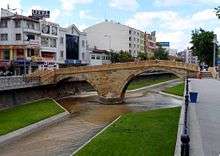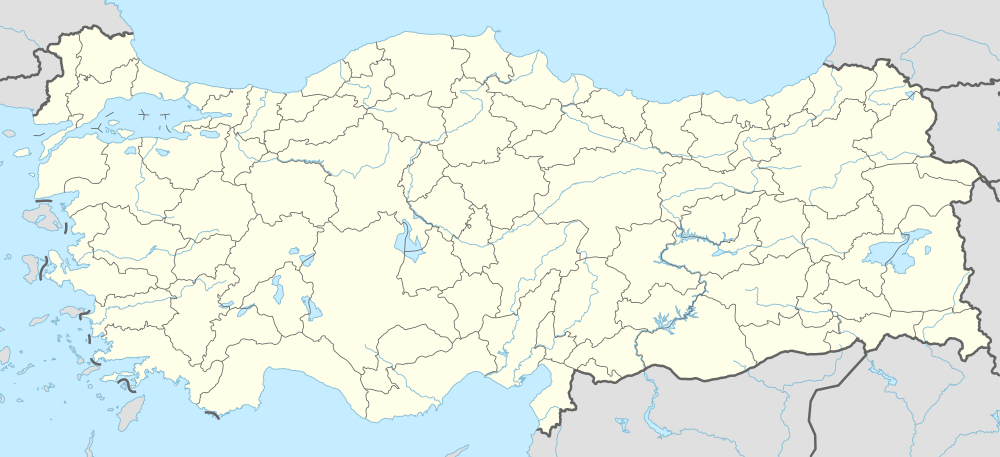Nasrullah Bridge
| Nasrullah Bridge Nasrullah Köprüsü | |
|---|---|
 Nasrullah Bridge in Kastamonu, Turkey | |
| Coordinates | 41°22′39″N 33°46′35″E / 41.37750°N 33.77639°ECoordinates: 41°22′39″N 33°46′35″E / 41.37750°N 33.77639°E |
| Crosses | Karaçomak Creek |
| Locale | Kastamonu, Turkey |
| Other name(s) | "Hunchback Bridge" (Turkish: Kambur Köprü) |
| Named for | Kadı Nasrullah |
| Characteristics | |
| Design | Arche bridge |
| Material | Stone |
| Total length | 40 m (130 ft) (originally) |
| Width | 4 m (13 ft) |
| Piers in water | 1 |
| History | |
| Construction end | 1501 |
| Statistics | |
| Daily traffic | Pedestrian |
 Nasrullah Bridge Location of Nasrullah Bridge in Turkey. | |
Nasrullah Bridge, also known locally as the Hunchback Bridge, (Turkish: Nasrullah Köprüsü or Kambur Köprü) is a 16th-century stone arch bridge in Kastamonu, Turkey.
The bridge is located in the city center over Karaçomak Creek, a tributary of Gökırmak, connecting western and eastern parts of the city.[1] Nasrullah Mosque is to the west and the Kastamonu Governor's Office is to the east. It was endowed as a waqf in 1501 by Kadı Nasrullah, who was a judge in the Ottoman Empire.[1]
The ashlar-constructed bridge had originally five arches. It was 40 m (130 ft) long and 4 m (13 ft) wide. The main arch span was 12.0 m (39.4 ft) and the others 8.5 m (28 ft) in length.[1] It underwent three major reparations, the last two times in 1709 and in 1946. During the last reparation, a staircase was added to each end of the bridge when the west-most one arch and the east-most two arches were ripped off. Today, the bridge has two arches only.[1] The two original stone alms pots and the curbstones on the bridge are still preserved.[2] Due to its unusual appearance, it is dubbed by the citizens the Hunchback Bridge (Turkish: Kambur Köprü).[2]
The Minister of Forestry Veysel Eroğlu announced in 2016 that the bridge will be reconstructed to its original form.[3]
References
- 1 2 3 4 "Kambur Köprü" (in Turkish). Neredekal. Retrieved 2016-07-18.
- 1 2 Boyacıoğlu, Metin (2015-12-04). "Bu köprü nerede?". Kastamonu Gazetesi (in Turkish). Retrieved 2016-07-18.
- ↑ ""Tarihi eser gibi bir köprü yapalım"". Gündem (in Turkish). 2016-07-01. Retrieved 2016-07-18.